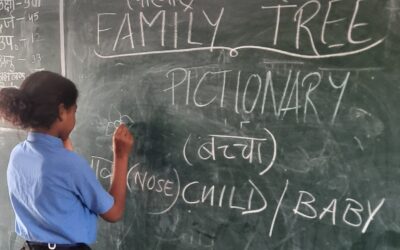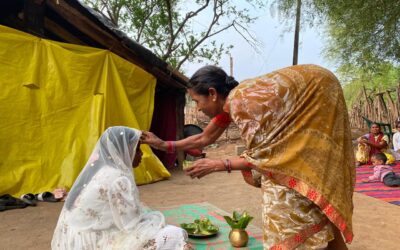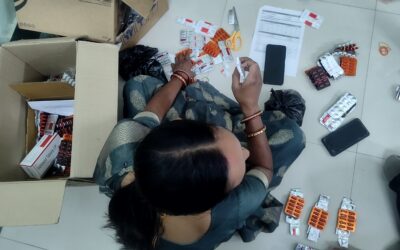Ramila* is a 22 year old woman who lives in Hathiya Talai, a village in Gogunda block of Udaipur, Rajasthan. Ramila had high fever on the third day after her delivery. Her baby died on the second day. “There was no breast milk and the baby would just not open her mouth, so we could not feed goat milk as well”, said Ramila. She had not seeked care from anywhere for the baby or for herself after delivery as she was told not to step out of the house by the bhopa (a term used locally for a faith healer).
Hansi* is a 28 year old woman who lives in Reechwada, a remote hamlet in Kadech Panchayat of Gogunda block. She was seen washing utensils outside her house four days after giving birth to her fifth child. Her baby was on a khaat (a cot made of wood and woven ropes) with goats tied to it. The baby developed an umbilical cord infection within a few days.
Mangli* is a 24 year old woman from Mundakhet village of Gogunda block. Mangli delivered her first baby in her parents house. Mangli’s neighbour, who is close to her, shares that the baby fell really sick because Mangli was not paying attention to her. She says, “Many times, she did not notice if the baby urinated and would not change her clothes. The baby started to get rashes and now has boils.” Mangli has moved from her husband’s house as he is in a relationship with another woman who he has now even brought home.
There are many Ramila’s, Hansi’s and Mangli’s we meet when we visit new-borns and the mothers as a part of our postnatal care program in AMRIT clinics. In Southern Rajasthan, home deliveries continue to happen in a lot of villages, especially among the Adivasis. Fear of going to hospitals, being uncomfortable around nurses or doctors who might not understand their language, comfort around the Dai (midwives), not having papers and documents like Aadhar Card which they might have to show in hospitals and lack of transportation are some of the many reasons stopping institutional deliveries.
What are postnatal care (PNC) visits?
While there are a significant number of women who opt for insitutional delivery, these numbers are still low in some of the remote hamlets. Our team of health workers and nurses at AMRIT clinics conduct postnatal care visits in such villages regularly. These visits are made to women who have had recently delivered a baby, either at home or at an institution. The team goes to meet them thrice within six weeks after delivery.
We try to make the first visit as soon as they are informed about it by our community volunteers. It helps in identifying any problems with the overall health and well being of the mother or the baby at an early stage. They are also a platform to address some Do’s and Don’ts during the postnatal period for these families where there is stigma and/or myths around breastfeeding, lack of awareness about sanitation practices and at times, difficult financial situations and household problems to focus on childcare.

From tricky cases of poorumbilical cord hygiene causing infection to cases of a baby being fed goat milk for the first few days after birth, there are many challenges we come across on a regular basis. One response for this at AMRIT Clinics has been to involve the local women who become our community volunteers to address these issues. These volunteers, known as Swasthya Kirans, have been trained on the importance of postnatal care, identifying danger signs, home care for a new born baby and the mother, and addressing the myths in the community.
Role of Swasthya Kirans in post natal care
Pavni Bai, one of our Swasthya Kirans in the Rawach clinic in Gogunda block of Udaipur has an interesting story. She once heard loud crying noise from her neighbour’s house late in the night. She recognised that this kind of noise is heard usually when someone dies. It was from a house where there was a new born baby. Pavni Bai had met the mother and child just a few days before and they seemed to be doing okay. Worried that it has something to do with the baby or the mother, she rushed to their house.
On reaching, she saw that the baby was on the floor, without any clothes on, and was surrounded by all the family members who were crying. “I was shocked to see this and went near the baby to check if there was any movement. I felt the heartbeat when I picked the baby up. It was cold and I immediately started warming it up. I asked them to bring some clothes to cover the baby and kept rubbing my hands, making them warm and providing warmth to the baby. Believe it or not, the baby who was declared dead by the family started crying!”, says Pavni Bai.

Just like how Pavni Bai has become the person who saved their baby’s lives for this family, many of our Swasthya Kirans have managed to support in the right ways at the right time with new borns and their mother’s well-being. Swasthya Kirans have ensured that women do not feed goat milk instead of mother’s milk because of superstitious beliefs. They have identified many children with cord infections, skin diseases, breathing difficulty, and mothers with heavy bleeding or fever at early stages.
I remember working with the team on a training module for Swasthya Kirans on postnatal care. We were including videos on how to breast feed and how to keep the baby warm (Kangaroo mother care). We included demonstrations of how to cover the baby in warm clothes like shawls, and discussions around cord care for the baby, advising against applying anything on the cord till it dries up naturally. Seemingly simple actions like changing clothes of the baby every time it’s wet make a lot of difference. While our team can check the vitals of the new born and the mother, day-to-day practices and lifestyle can only be addressed most powerfully by our Swasthya Kirans.
*Names changed to maintain confidentiality




0 Comments